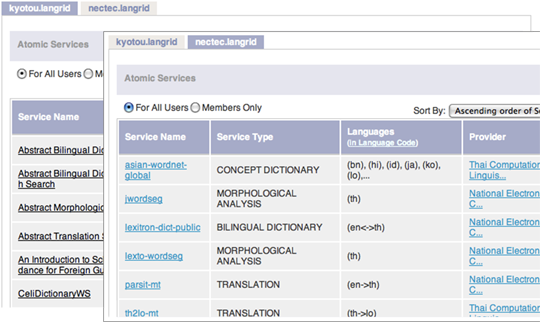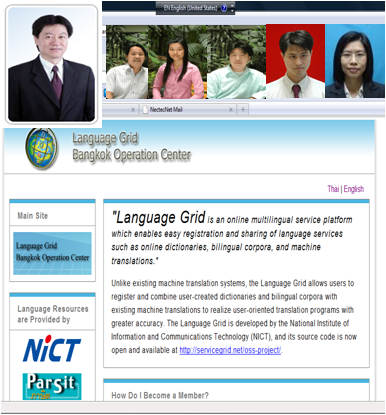Contents
[Federated Operation Begins for the Language Grid]
![]()
[New Function of Service Manager Released]
![]()
[New Language Resources]
![]()
[Language Grid Symposium 2011]
![]()
[Monthly Maintenance for January and February]
![]()
[Language Grid Users] Language Grid Bangkok Operation Center (NECTEC)
![]()
Federated Operation Begins for the Language Grid
On November 3, the Language Grid Kyoto Operation Center (Department of Social Informatics, Kyoto University) and Language Grid Bangkok Operation Center (NECTEC) concluded a Service Grid agreement for federated operation of the Language Grid from January. By connecting the two grids, users can not only share lists of language services across them, but also utilize the services. This allows users of the Kyoto center to access services on the Language Grid operated by the Bangkok center, including three Thai morphological analyses, the Lexitron English-Thai dictionary, Parsit English-Thai translation tool, VAJA Thai text-to-speech service, Thai-Lao translation, and Asian WordNet, supporting 13 Asian languages such as Indonesian, Korean, Thai, Japanese, Hindi, and Vietnamese.
Invoking the language services managed by the Bangkok center requires obtaining WSDL files from the Service Manager, as is the current practice. As shown in the figure, users can switch between language service lists by clicking a tab, and obtain WSDL files of those on the Language Grid operated by the Bangkok center. Those services can also be bound to composite services because they are invoked through the Language Grid core node operated by the Kyoto center. When binding them, users must set the binding information in a "grid ID:service ID" format. The Grid ID is shown on the tab of the language service list.

Federated operation of the Language Grid also enables users of the Bangkok center to access language services on the Language Grid operated by the Kyoto center. Service providers permitting users of the Bangkok center to use their services should check Federation Use in the Terms of Service Use attribute within the service profile using the Service Manager. When providers have already chosen "All the Users of the NECTEC's Service Grid are allowed to use my resources" in the Resource/Service Licensing Sheet enclosed with the agreement, Federation Use will have already been checked. Providers choosing individually licensed users for their services can set the permission at "Providing Services -> Control of Language Services" in the Service Manager.
New Function of Service Manager Released
The Language Grid Service Manager enables users to browse their invocation histories. After logging in, go to "Using Services -> Your Service Calls". This will list not only the service invocation time but also component services of the invoked composite services, success and failure of invocation, execution time, data transfer size, and copyright and license information. When service invocation fails, the type of error can be confirmed, which allows tracing of the invocation sequence that raised the error.
New Language Resources
(Language Resource Name / Service ID / Service Provider are listed below.)
- Julius (speech recognition) / Julius / Kawahara Laboratory, Department of Digital Content Research, Academic Center for Computing and Media Studies, Kyoto University
Julius recognizes speech data input via microphones and converts it into text. Julius is the first speech recognition service registered on the Language Grid. It currently supports only Japanese, but it can be used originally for various languages based on given language models and dictionaries.
- BLEU(similarity calculation)/ BLEU / Ishida and Matsubara Laboratory, Department of Social Informatics, Graduate School of Informatics, Kyoto University
BLEU calculates similarity between two input sentences. This service is language-independent. Translation quality can be estimated as high when there is high similarity between an input sentence and the back-translation result. This enables automatic selection of the best translation result from output by certain machine translation services on the Language Grid.
- KyotoEBMT (example-based machine translation) / KyotoEBMT-nlparser_KNP_EDICT / Kurohashi Laboratory, Department of Intelligence Science and Technology, Graduate School of Informatics, Kyoto University
Example-based machine translation learns from parallel texts and outputs a very high-quality translation result if an input sentence is similar to the given parallel texts. Kyo-toEBMT currently supports English<->Japanese translation.
Language Grid Symposium 2011
Language Grid Symposium 2011 will be held in February 2011. The symposium will include discussion of the Service Grid, full launch of the Open Source Project of Toolbox, and multi-language communication activities and study using the Language Grid. We look forward to seeing you there.

Tokyo
Date: Monday, February 21, 2011
Time: 2 - 5 p.m.
Venue: Tokyo Office, Kyoto University
27th floor, Shinagawa INTERCITY A Tower,
2-15-1 Konan, Minato-ku, Tokyo, 108-6027
Kyoto
Date: Tuesday, February 22, 2011
Time: 2 - 5 p.m.
Venue: COCON KARASUMA
Presentation Room, 4th floor
620 Suiginya-cho, Karasuma-dori, Shijo-sagaru,
Shimogyo-ku, Kyoto-shi, Kyoto, 600-8411
Monthly Maintenance for January and February
The next maintenance of the Language Grid will be conducted on Tuesday, January 11 and Monday, February 7 at 18:00-21:00 JST. If you wish to use the Language Grid during this period, please contact us in advance at operation [at] langrid.org.
Language Grid Users: Language Grid Bangkok Operation Center (NECTEC)

The National Electronics and Computer Technology Center (NECTEC) was established in September 1986. Its main responsibilities are undertaking, supporting, and promoting the development of electronics and computer technologies through research and development. NECTEC also provides a linkage between research communities and industries through established industrial clusters.
The Language Grid Bangkok Operation Center was initiated by Dr. Virach Sornlertlamvanich, assistant director of NECTEC, and is operated by the Human Language Technology (HLT) Laboratory. HLT pursues multidisciplinary research and development in spoken and written language technologies. Its primary objective is facilitating human-machine and human-human communication, by such means as machine translation, information retrieval, speech processing, and language resources.
We are currently collecting Thai NLP in NECTEC for entry into the Bangkok Operation Center, with such services as such as Thai word segmentation, the Lexitron electronic dictionary, and Parsit English-to-Thai automatic machine translation.
We plan to extend the Language Grid to cover our collaborative partners, including Chulalongkorn University, Kasetsart University, Sirindhorn International Institute of Technology, Thai Computational Linguistics, and NICT.
